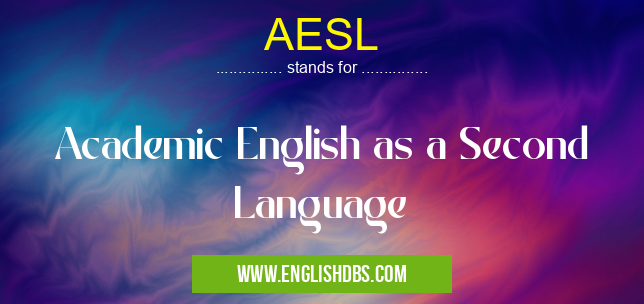What does AESL mean in ACADEMIC & SCIENCE
AESL stands for Academic English as a Second Language. It is a specialized field of education that focuses on teaching English to non-native speakers in an academic context. AESL programs are typically designed to prepare students for academic success in higher education institutions where English is the primary language of instruction.

AESL meaning in Academic & Science in Academic & Science
AESL mostly used in an acronym Academic & Science in Category Academic & Science that means Academic English as a Second Language
Shorthand: AESL,
Full Form: Academic English as a Second Language
For more information of "Academic English as a Second Language", see the section below.
AESL Meaning in Science
In the context of science, AESL plays a crucial role in enabling non-native English speakers to understand and contribute to scientific discourse. Scientific research, publications, and conferences rely heavily on English as the lingua franca. AESL programs equip students with the necessary language skills to comprehend complex scientific concepts, communicate their research findings effectively, and participate in international scientific collaborations.
AESL Full Form
The full form of AESL is Academic English as a Second Language. It emphasizes the academic nature of the English language instruction, as opposed to general English language learning for everyday communication.
What does AESL Stand for?
AESL stands for Academic English as a Second Language. It represents a specialized field of education that aims to:
- Enhance non-native English speakers' proficiency in academic English
- Prepare students for success in English-medium academic environments
- Develop language skills essential for scientific research and communication
- Facilitate participation in international scientific communities
Essential Questions and Answers on Academic English as a Second Language in "SCIENCE»SCIENCE"
What is AESL?
AESL stands for Academic English as a Second Language. It is a specialized field of English language teaching that focuses on the development of English language proficiency in academic contexts, such as universities and colleges.
Who is AESL for?
AESL is designed for students who are non-native speakers of English and who need to improve their English language skills in order to succeed in an academic environment.
What does AESL instruction typically include?
AESL instruction typically includes a focus on developing reading, writing, speaking, and listening skills in academic contexts. It may also include instruction in research methods, academic writing conventions, and critical thinking skills.
How can I find an AESL program?
AESL programs are typically offered by universities and colleges. You can search for AESL programs in your area online or by contacting your local educational institution.
What are the benefits of taking an AESL course?
Taking an AESL course can help you to improve your English language skills, develop academic writing and research skills, and prepare for success in an academic environment.
Final Words: AESL is a vital component of education for non-native English speakers aspiring to pursue higher education or careers in science. By providing specialized language instruction tailored to the demands of academic and scientific contexts, AESL empowers students to engage fully in the global scientific community and contribute to its advancement.
AESL also stands for: |
|
| All stands for AESL |
